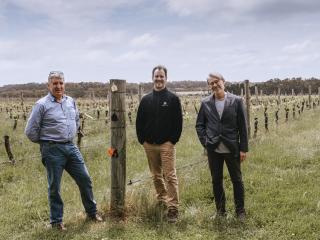The second vintage of Cabernet Sauvignon wines made from a trial of vine clones and selections was bottled in the South West recently, opening the door to more high performance grape varieties and opportunities for Western Australian vignerons.
The trial is part of a Department of Primary Industries and Regional Development (DPIRD) collaboration with Howard Park Wines, Wines of WA and Wine Australia.
The project is examining the performance of a number of Australian, American and French derived clones and selections under WA growing conditions.
WA is recognised internationally as a premium producer of Cabernet Sauvignon – the State’s highest value wine grape variety.
Most WA Cabernet Sauvignon plantings are established from a small number of wine grape clones and selections.
DPIRD research scientist Richard Fennessy said the addition of more diverse clones and selections to WA vineyards could help take Cabernet Sauvignon production to the next level.
“A ‘clone’ is a vine that has been naturally derived from a single vine ‘mother’, making it initially genetically identical,” he said.
“Whereas ‘selections’ are sourced from a multitude of different vines, typically from a high performance vineyard block.
“Clones and selections are identified for desirable traits to enhance vine production, like improved disease resistance, vigour, yield, fruit size, or improve fruit quality, such as acidity, sugar levels, colour intensity or taste.
“This project aims to understand the characteristics of the different clones and selections across multiple vintages, focusing on field performance and wine qualities.”
In 2019 a one hectare block of mature Cabernet Sauvignon at Howard Park Wines, Margaret River, was grafted to 14 clones and selections of Cabernet Sauvignon.
Vineyard observations were taken during the growing season, measuring the timing of key growth stages, yield, fruit characteristics and vegetative growth.
Data from a number of seasons will be collected to identify consistent traits expressed by the clones and selections.
“These clones were selected for the attributes expressed in their regions of origin,” Mr Fennessy said.
“Our research will assess if these same or different attributes are observed under WA conditions.”
Preliminary findings from the research show the clones and selections ripen at different times and that tannin profiles clearly varied.
This information may guide growers to plant a range of clones/selections to alleviate compressed harvest periods associated with a warming climate – relieving logistical pressures.
It also creates the opportunity to tailor tannin profiles to match desired wine styles to better target market preferences.
The wines from the project are made at DPIRD’s Bunbury fermentation laboratory and presented to industry for evaluation and consideration for future production at wine tasting workshops each year.
Fourteen small-lot trial wines from latest vintage were presented to the team at Howard Park Wines recently, which received really positive feedback.
Howard Park Wines chief viticulturalist David Botting said the wines from the 2022 and future vintages would start a valuable conversation about the future of cabernet sauvignon production in the South West.
“The wines showcase the genetic diversity of cabernet sauvignon planting material already available in WA that hasn’t yet been fully utilised,” he said
“These tastings will be invaluable in building local knowledge and helping to maintain consistency and enhancing the uniqueness of our cabernet sauvignon offering, in the face of vintage variations and long term climate changes.”
Mr Botting said Howard Park Wines was excited to host and contribute to the progress of the field trial.
“This trial is unique in Australia – and possibly the world – considering the number and origins of the clones involved, its robust scientific design and extensive replication,” he said.
“From a scientific view point, we can rely on the objective data and ongoing observations from this field trial site, providing a great deal of confidence in the outcomes.”

Media contacts:
Jodie Thomson/Megan Broad, media liaison, DPIRD
+61 (0)8 9368 3937
